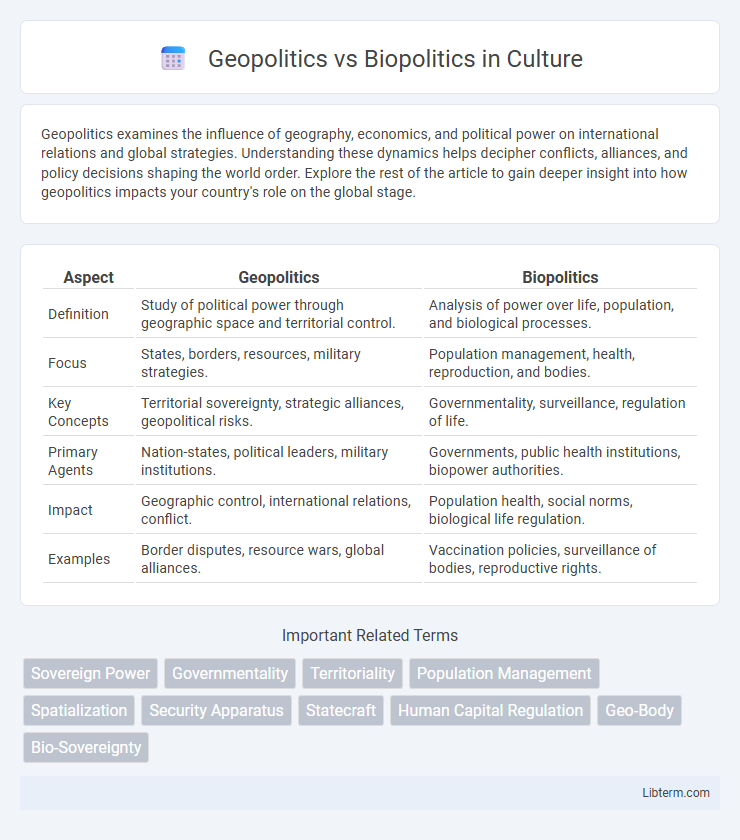Geopolitics examines the influence of geography, economics, and political power on international relations and global strategies. Understanding these dynamics helps decipher conflicts, alliances, and policy decisions shaping the world order. Explore the rest of the article to gain deeper insight into how geopolitics impacts your country's role on the global stage.
Table of Comparison
| Aspect | Geopolitics | Biopolitics |
|---|---|---|
| Definition | Study of political power through geographic space and territorial control. | Analysis of power over life, population, and biological processes. |
| Focus | States, borders, resources, military strategies. | Population management, health, reproduction, and bodies. |
| Key Concepts | Territorial sovereignty, strategic alliances, geopolitical risks. | Governmentality, surveillance, regulation of life. |
| Primary Agents | Nation-states, political leaders, military institutions. | Governments, public health institutions, biopower authorities. |
| Impact | Geographic control, international relations, conflict. | Population health, social norms, biological life regulation. |
| Examples | Border disputes, resource wars, global alliances. | Vaccination policies, surveillance of bodies, reproductive rights. |
Introduction: Defining Geopolitics and Biopolitics
Geopolitics analyzes the influence of geographic factors on political power, state behavior, and global strategy, emphasizing territory, resources, and borders. Biopolitics examines the governance of populations through biological and social processes, focusing on life, health, and body regulation within political frameworks. Both fields intersect by addressing power dynamics but differ in scope: Geopolitics centers on external spatial control, while Biopolitics emphasizes internal population management.
Historical Origins and Evolution
Geopolitics emerged in the late 19th century with scholars like Friedrich Ratzel emphasizing the influence of geography on state power and territorial control, shaping diplomatic strategies through spatial analysis. Biopolitics developed in the 20th century, notably through Michel Foucault's work, highlighting the governance of populations via policies regulating life, health, and biological processes. The evolution of geopolitics focuses on power struggles between states, while biopolitics examines the management of human life within political systems.
Key Theoretical Frameworks
Geopolitics centers on the strategic relationships between states, territory control, and global power dynamics, drawing on theories like classical realism, critical geopolitics, and the Mackinder's Heartland Theory. Biopolitics, developed by Michel Foucault, examines the governance of populations through regulatory controls on life, health, and bodies, emphasizing power mechanisms beyond traditional sovereignty. Key theoretical frameworks contrast the spatial and strategic focus of geopolitics with biopolitics' attention to life processes and population management within political power structures.
Geopolitics: Power, Territory, and State Interests
Geopolitics centers on the strategic management of power through control over territory, emphasizing state interests in maintaining sovereignty and influence within the global arena. It examines how geographical factors such as location, natural resources, and physical boundaries shape political decisions and power dynamics among nations. State actors utilize geopolitical strategies to secure borders, project military strength, and negotiate alliances that reinforce national dominance and economic advantage.
Biopolitics: Governance of Life and Populations
Biopolitics centers on the governance of life and populations through regulatory mechanisms that manage health, reproduction, and bodies at individual and collective levels. It involves state power shaping biological processes by controlling public health policies, surveillance, and social norms to influence population dynamics. Unlike geopolitics, which deals with territorial power and state relations, biopolitics emphasizes the intersection of political power with human life and biological existence.
Intersection and Divergence: Comparing Approaches
Geopolitics centers on territorial power, state sovereignty, and international relations, emphasizing control over land and resources, while biopolitics focuses on managing populations through regulatory mechanisms affecting bodies and life processes. The intersection lies in how state power exerts control both geographically and biologically, as seen in border policies that integrate security measures with public health management. Divergence appears in scope and methods: geopolitics addresses external state relations and strategic interests, whereas biopolitics concentrates on internal governance and the regulation of life, health, and social behavior.
Geopolitics in Contemporary World Events
Geopolitics in contemporary world events centers on the strategic competition for resources, territory, and influence among global powers such as the United States, China, and Russia, driven by shifts in military capabilities, economic partnerships, and alliances. The South China Sea dispute, Russia's actions in Ukraine, and the U.S.-China rivalry in technology and trade illustrate how geographical factors and national interests shape diplomatic and security policies. Energy security, migration patterns, and the control of critical infrastructure continue to be pivotal in understanding state behavior and regional stability within the geopolitical framework.
Biopolitics in Public Health and Surveillance
Biopolitics in public health centers on the governance of populations through regulations, medical interventions, and surveillance systems aimed at controlling disease spread and promoting collective health. This approach employs data analytics, epidemiological tracking, and digital monitoring technologies to manage risks and enforce health policies effectively. The integration of biopolitical strategies in public health enhances state capacity to anticipate, mitigate, and respond to health crises, while raising critical ethical questions about privacy and individual autonomy.
Globalization: Shifting Boundaries of Power
Globalization reshapes the geopolitics of state sovereignty by blurring traditional boundaries through transnational economic networks and supranational institutions, challenging conventional power hierarchies. Biopolitics emerges alongside, as governments increasingly regulate populations via health, migration, and surveillance policies that transcend national borders. This dynamic interplay between geopolitical strategies and biopolitical governance redefines authority in a hyperconnected world where control is exercised over both territories and bodies.
Future Trends: Converging Discourses and Challenges
Future trends in geopolitics and biopolitics reveal increasing integration as global health issues become central to national security and international relations. The convergence of these discourses highlights challenges such as managing pandemics, bio-surveillance technologies, and ethical governance of biotechnologies within geopolitical frameworks. Emerging strategies emphasize multi-sector collaboration to address biosecurity threats while balancing sovereignty, human rights, and global cooperation.
Geopolitics Infographic

 libterm.com
libterm.com